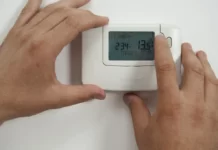What is a Water Heater?
A water heater is a household appliance responsible for heating and supplying hot water for various purposes in a home. It is crucial in providing comfort, convenience, and hygiene for daily activities. Here’s why a water heater is important in every home:
Why Water Heater is Important for Home
1. Hot Water Supply: A water heater ensures a steady hot water supply for essential tasks like bathing, showering, washing dishes, and laundry. Hot water improves personal hygiene, helps remove dirt and grease more effectively, and provides a comfortable bathing experience.
2. Seasonal Comfort: A water heater becomes essential for maintaining a comfortable living environment during cold weather or in regions with colder climates. It allows you to enjoy warm showers and provides warmth for washing hands, reducing discomfort and the risk of exposure to extreme temperatures.
3. Cleaning and Sanitization: Hot water is instrumental in cleaning and sanitizing various items in the household. It helps remove tough stains, grease, and bacteria from dishes, cookware, and utensils. Hot water is also effective in laundering clothes, killing germs, and eliminating allergens.
4. Household Chores: Many household chores require hot water, such as mopping floors, cleaning surfaces, and washing windows. Hot water aids in breaking down dirt and grime, making these tasks more efficient and effective.
5. Cooking and Food Preparation: Hot water is used in the kitchen to cook, brew coffee or tea, and prepare meals. It helps with food preparation, such as blanching vegetables, cooking pasta, or sterilizing kitchen tools.
6. Hygiene and Health: Hot water is essential for maintaining personal hygiene and health. It facilitates thorough handwashing, ensuring the removal of germs and bacteria. Hot water also supports proper oral hygiene by providing warm water for brushing teeth and rinsing mouth.
7. Relaxation and Wellness: A water heater enables hot water for therapeutic purposes. It allows individuals to enjoy hot baths or showers, promoting relaxation, relieving stress, soothing muscle tension, and improving blood circulation.
8. Convenience and Time-saving: Having a water heater eliminates the need to heat water manually using alternative methods, such as boiling on a stove. It saves time and effort, providing instant access to hot water whenever needed.
9. Family Comfort: A water heater ensures family members can access warm and comfortable water for their daily activities, regardless of age or needs. It enhances the overall quality of life and promotes well-being within the household.
A water heater is vital in every home, offering a steady hot water supply for numerous purposes. It supports personal hygiene, household cleaning, and cooking, providing comfort and convenience for daily routines. Installing a reliable water heater ensures a comfortable and functional home environment for you and your family.
Signs Your Water Heater is Going to Explode
A water heater is essential in our homes, providing hot water for various daily activities. However, like any mechanical device, water heaters can deteriorate over time, potentially leading to dangerous situations such as explosions. It is crucial to recognize the warning signs that indicate your water heater is going out and take preventive measures to avoid a catastrophic event. In this article, we will outline the signs that suggest your water heater is at risk of exploding and provide tips on preventing such a disaster.
Signs Your Water Heater Is Going Out
1. Age of the Water Heater
The age of your water heater plays a significant role in its potential for failure. Most conventional water heaters have a lifespan of about 8 to 12 years. As a water heater approaches or exceeds this range, the likelihood of problems increases, including the risk of explosion.
2. Rusty or Corroded Tank
Inspect your water heater tank for signs of rust or corrosion. Rust weakens the metal structure of the tank, making it susceptible to leaks and eventual failure. If you notice rust or corrosion on the tank, your water heater is deteriorating and needs immediate attention.
3. Leaking Water
Any signs of water leaking from your water heater are cause for concern. Leaks can indicate cracks or other damage to the tank, which may lead to a catastrophic failure. If you notice pooling water around the water heater or signs of dampness, it is crucial to have a professional plumber assess the situation promptly.
4. Strange Noises
Unusual noises coming from your water heater, such as rumbling, popping, or banging sounds, could indicate the presence of sediment buildup. Over time, sediment can accumulate at the bottom of the tank, causing it to overheat and potentially lead to an explosion. Flushing the tank regularly can help prevent sediment buildup and reduce the risk of an explosion.
5. Fluctuating Water Temperatures
If you experience inconsistent water temperatures, with hot water suddenly turning extremely hot or cold, it could be a sign that your water heater is malfunctioning. A faulty thermostat or heating element can cause overheating and pose a significant risk. Have a professional plumber inspect and repair the issue promptly.
Preventing Water Heater Explosions
1. Regular Maintenance
Schedule regular maintenance for your water heater, including professional inspections and servicing. A qualified plumber can identify potential issues and perform necessary repairs or replacements before they escalate.
2. Flushing the Tank
Flush your water heater tank annually to remove sediment buildup. This process helps maintain optimal efficiency, prevents overheating, and reduces the risk of an explosion. Refer to the manufacturer’s instructions or consult a professional plumber for guidance on how to flush your specific water heater model.
3. Temperature and Pressure Relief Valve (T&P Valve)
Ensure your water heater has an available T&P valve installed. This valve is designed to release excess pressure and prevent the tank from becoming over-pressurized, reducing the risk of an explosion. Regularly test the T&P valve to ensure it is working correctly.
4. Professional Installation
Always hire a licensed professional to install a new water heater or replace an old one. Proper installation ensures that the water heater operates safely and reduces the chances of accidents or explosions caused by incorrect setup.
Conclusion
Recognizing the warning signs that indicate your water heater is going out is crucial for preventing potential disasters such as explosions. Regular maintenance, quick repairs, and taking precautions can cut the risk of an explosion by a large amount. By staying vigilant and promptly addressing any signs of deterioration, you can ensure the safety and longevity of your water heater while protecting your home and loved ones from any potential harm.












